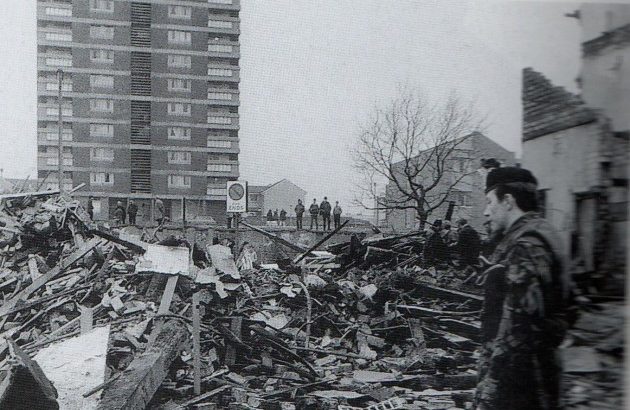The View
When someone you love dies suddenly, it is a terrible moment, often of disbelief because the person who went out to work or to school, or the little child who went out to play is never coming back. All your realities are shattered, things can never be the same again. Gradually there comes the realisation that you must lay a loved one to rest, that they are never coming back again, that you will never hear the voice, look into the eyes, hold the hand, be held and loved by them again in this world. Their going does indeed seem annihilation.
When that happens as the consequence of sudden catastrophic illness it is very hard. When the dying is the result of an accident, we so often need to know why, what happened? ‘Did they suffer?’ ‘What was their pain?’
Thousands of people on the island of Ireland over the past nearly half century have known that moment, not through illness, or accident, but through terrorism. Their reality is that some other human being decided that their loved one would die that day.
Sometimes the killers did not know or care who they were setting out to kill. Sometimes there was an identified target, a person chosen for death because of their faith, or their job, or because they were associated with a particular tradition or group.
When such things happen we want to know why: ‘Why did my loved one die through bomb or bullet?’ ‘Who did it?’ ‘How did the killers manage to do what they did?’
Property
When this happens there is another group of people charged with the protection of life and property whose job it is to do all they can to detect the criminal(s) and to bring them to justice. We call them the police. It is their duty to investigate in an attempt to identify suspected killers for prosecution, with the possibility that, if there is no reasonable doubt, then the accused will be convicted and sentenced, all in accordance with the Rule of Law.
That is the theory. However, we know only too well now that in Northern Ireland things did not always work like that. We know because it has been shown to be the case, that the normal rules were not always followed, that in some cases, even where people admitted murder, they were not charged, that evidence was lost, that searches were forbidden, that arrests were not permitted.
We even know that in some cases the police had prior information that something was going to happen, but no action was taken. Sometimes the failure to act is inexplicable and unexplained.
When these things happen we talk of collusion. So many inquiries have been held into collusion in Northern Ireland that we have a number of definitions – by Canadian Judge Cory, De Silva, John Stevens. The essence of these definitions is that something which should have been done has not been done, or something which should not have been done has occurred, allowing the murderer to walk free: free, if he or she chooses to do so, to kill again.
These things happened in Northern Ireland, just as they have happened in so many wars over the centuries, where alliances were formed between terrorists and those charged with the fight against terrorism.
Collusion is not a crime. Nobody can be convicted of collusion. Yet it can be shown that it happened. Rarely is it possible to convict someone for conspiracy to commit murder, or misconduct in public office. Just as terrorists do not keep detailed records of their activities to assist those investigating their crimes, so those who collude with them, do not keep a record of their decision making, of who actually destroyed the evidence, who authorised the decision to arrest someone in connection with a murder, hold them for a period of time, and then let them go without even questioning them, so that it looks as if investigation occurred. That is how collusion happens.
The NI Assembly has shown itself incapable of handling these and other legacy matters in the interests of the victims. The British Government has a duty now, almost 20 years after the Good Friday Agreement, to provide an independent historical inquiries commission, properly empowered to investigate all the crimes of the Troubles, with an adequate budget, and total cooperation from all the agencies in both Ireland and the UK. This is not happening.
The resources cannot be taken from the PSNI budget. They must be provided by Government in the same way that it has funded enquiries such as Hillsborough, Gossport, Litvinenko and others in the rest of the UK.
There are, of course, reasons why the IRA, the UVF, the UDA, the INLA and all the other terrorist organisations do not want this to happen. They all killed their own, as well as the other, and some of those who were once involved in terrorism have now moved on, and are said to be contributors to the Peace Process.
For MI5 and the military in the UK, the disclosure that collusion was a reality has been terrible. That agents of the state, who supplied information for “the fight against terrorism” were allowed to continue their murderous activities without being made accountable, as they could have been, for their crimes is something which, for most people, is unthinkable.
It has grown significant distrust in the authorities. Yet it happened. De Silva, Cory, Stevens, and even I, as Police Ombudsman, told how it happened. I am still working on cases allegedly involving collusion by members of state agencies working with the UVF, and with the IRA in the case of the alleged agent known as Stakeknife.
There are two reasons why independent investigation must occur. One is that we need to learn the lessons of the past.
We need to be able to show precisely how it happened, so that we can put in place the mechanisms to prevent it happening again; to prevent communities being unable through fear or otherwise from helping the police with today’s fight against terrorism.
The other is that that those who have suffered so much, in the loss of their loved ones through terrorism, will at last know as much as is to be known about the circumstances in which those deaths occurred.
Suspects
In the rare cases where prosecution is a possibility, suspects should be placed before the courts and dealt with in accordance with the Rule of Law which is one the foundations of both states, and of which we proclaim ourselves to be so proud.
We must not forget or ignore the bereaved. We must comfort them by ensuring that these issues are dealt with. We must build the future on integrity and honesty.


 Nuala O’Loan
Nuala O’Loan
